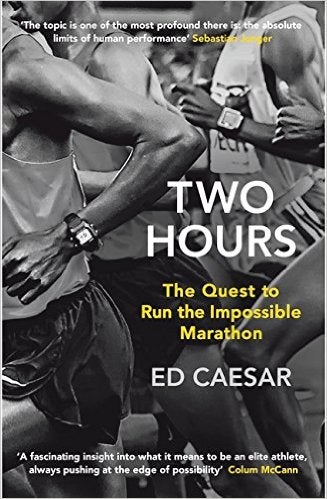Two Hours: The Quest to Run the Impossible Marathon, By Ed Caesar - book review
Viking - £16.99

Nominally about the world of elite distance running and its quest to break the two-hour marathon mark, Two Hours also works with great style and efficiency as a history of the marathon and the consistently enormous interest it generates.
Caesar uses the Kenyan distance runner Geoffrey Mutai as the skeleton key into this strange world, and does so with heart-warming fondness for his subject. We follow Mutai’s career from a small rural town where he was employed to break rocks for construction, to the luxury hotels of Manhattan where he sits as part of a tiny number who are paid eye-watering fees to race in the marathon majors.
At the time of writing, Mutai had run the fastest recorded marathon, 2:03:02, a time that enables not just one man but a small industry of trainers, managers and pacers to survive. As Caesar explains, “marathon runners are not just athletes; they are economies”. The curious combination of altitude, iron will and the way that training a champion can take over an entire village is examined in great detail here, as are the psychological and physiological requirements of running these distances at such speed. The record edges ever closer, albeit at a glacial pace (Dennis Kimetto has now set a new time of 2:02:57) but public enthusiasm shows no sign of waning.
In putting Mutai’s career trajectory into context, Caesar provides a neat history of the marathon itself, from its fabulous Grecian origin myth to its evolution via eccentric Victorian Londoners, ambitious Italians and the American aerobics enthusiasts of the 1970s. He is excellent on the minutiae of the sport: the pace cars, the casualties of fame and the economics of a race whose elite are currently from such a small, specific area of the world but whose amateurs are largely well-off white men. It is good to see the economics laid bare by a writer as insightful as Caesar: the major sponsors of the big marathons are almost all financial institutions. Of course they are.
It’s Caesar’s first book, but his prose has been honed on long reads for The Independent and The New Yorker, and he’s a delight to read after the Boy’s Own bravado that some running books can be steeped in. No real conclusions are drawn about what it might take to break that record, but that won’t stop it becoming the definitive book on professional marathon running.
Running Like a Girl, by Alexandra Heminsley, is published by Windmill Books
Going the distance
Subscribe to Independent Premium to bookmark this article
Want to bookmark your favourite articles and stories to read or reference later? Start your Independent Premium subscription today.

Join our commenting forum
Join thought-provoking conversations, follow other Independent readers and see their replies